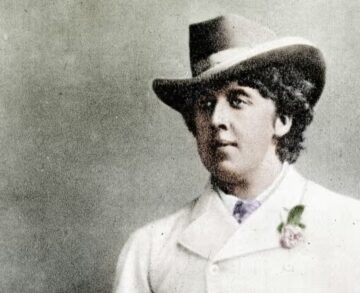Tom Crewe in The Guardian:
 There is a well-known passage in EM Forster’s Maurice, written in 1913 but not published until 1971, after Forster’s death. Maurice, who has “failed to kill lust single-handed”, resolves to consult a doctor about his problem. “I am an unspeakable,” he confesses, “of the Oscar Wilde sort.” What is “unspeakable” is immediately revealed by the use of Wilde’s name: that Maurice is homosexual. To be an “Oscar Wilde sort” was to be gay – but was it to be anything like Oscar Wilde? This was the problem troubling men of Forster’s generation and after, at least until the legalisation of homosexuality in England and Wales in 1967 (Scotland did not follow until 1981, Northern Ireland until 1982, Ireland until 1993). Wilde’s scandalous exposure created a set of public assumptions and prejudices that persisted for well over half a century, often twisting how gay people saw themselves. Among these was the belief that gay men, like Wilde, imposed themselves on the world by their difference: that they dressed differently, talked differently, were “theatrical”. That their relationships – as Wilde’s were alleged to have been – were crudely sexual, exploitative, mired in inequalities of age and class. That their susceptibility to blackmail brought them into contact with criminality, made them suspect. That they might always be one misstep away from tragedy. Maurice was an attempt to argue with these ideas, but the fact that Forster felt unable to publish it in his lifetime is a testament to their grip.
There is a well-known passage in EM Forster’s Maurice, written in 1913 but not published until 1971, after Forster’s death. Maurice, who has “failed to kill lust single-handed”, resolves to consult a doctor about his problem. “I am an unspeakable,” he confesses, “of the Oscar Wilde sort.” What is “unspeakable” is immediately revealed by the use of Wilde’s name: that Maurice is homosexual. To be an “Oscar Wilde sort” was to be gay – but was it to be anything like Oscar Wilde? This was the problem troubling men of Forster’s generation and after, at least until the legalisation of homosexuality in England and Wales in 1967 (Scotland did not follow until 1981, Northern Ireland until 1982, Ireland until 1993). Wilde’s scandalous exposure created a set of public assumptions and prejudices that persisted for well over half a century, often twisting how gay people saw themselves. Among these was the belief that gay men, like Wilde, imposed themselves on the world by their difference: that they dressed differently, talked differently, were “theatrical”. That their relationships – as Wilde’s were alleged to have been – were crudely sexual, exploitative, mired in inequalities of age and class. That their susceptibility to blackmail brought them into contact with criminality, made them suspect. That they might always be one misstep away from tragedy. Maurice was an attempt to argue with these ideas, but the fact that Forster felt unable to publish it in his lifetime is a testament to their grip.
More here.
